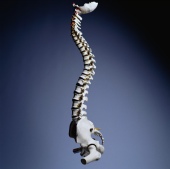
MONDAY, Feb. 8 (HealthDay News) — An experimental drug that inhibits serotonin in the gut cured osteoporosis in lab mice and rats, a new study has found.
Previous research has shown that serotonin in the gut hinders bone formation. Most current drugs for osteoporosis only prevent the breakdown of bone; they don’t build bone.
“New therapies that inhibit the production of serotonin in the gut have the potential to become a [new] class of drugs to be added to the therapeutic arsenal against osteoporosis,” study author Dr. Gerard Karsenty, chairman of the department of genetics and development at Columbia University College of Physicians and Surgeons, said in a university news release.
In the new study, published in the Feb. 7 issue of Nature Medicine, small daily doses of the new drug were given by mouth for up to six weeks to rodents with postmenopausal osteoporosis. The treatment prevented osteoporosis from developing or fully cured rodents in which osteoporosis was already present.
While the drug inhibited serotonin in the gut, levels of serotonin remained normal in the rodents’ brains. This indicates that the drug didn’t enter general circulation and wasn’t able to cross the blood-brain barrier, thus greatly reducing the risk of side effects.
“With tens of millions of people worldwide affected by this devastating and debilitating bone loss, there is an urgent need for new treatments that not only stop bone loss but also build new bone. Using these findings, we are working hard to develop this type of treatment for human patients,” Karsenty said.
More information
The American College of Rheumatology has more about osteoporosis.

